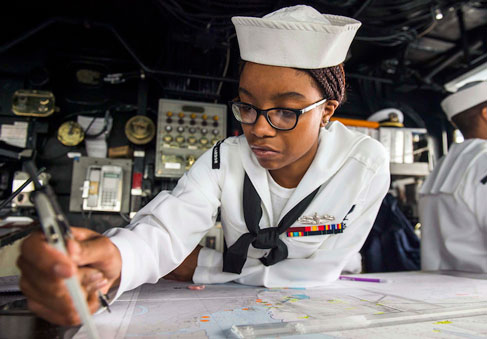Imagery is a mental skill that involves using all your senses to visualize experiences you haven’t had yet or recreate events, which can help optimize your performance. When you purposely practice imagery skills, it can lead to better decision-making, fewer errors, improved focus, increased confidence, and less stress and anxiety.
Imagery is the practice of seeing (and feeling) how you want to perform a skill—as if you’re actually doing it. It’s effective because your brain is hardwired to see in pictures, and imagery can help boost your performance in many ways.
- Better manage high-stress environments. As a Warfighter preparing for a critical mission, have you ever imagined your teammates beside you in theater, hearing the commands, smelling the smoke, tasting the dust, or feeling your heartbeat as if you’re already there? It can be tough to manage your thoughts and emotions in those high-pressure situations. Still, you can increase your confidence by imagining what your environment might look and feel like, how to cope when your heart starts pounding and your breathing becomes uneven, and what you might say to yourself to stay composed.
- Learn and improve new skills. Imagery can help you learn and practice motor skills such as firing a weapon or shooting a free throw. When you imagine executing a task, your brain sends signals to those muscles being used as if you’re actually doing it. And it creates a mental blueprint that allows your brain and body to remember how to practice those skills without actually performing them. It’s important to combine physical practice with mental practice for the best results. And remember, like physical training, repetition builds strength.
- Stay on track with goals. Spending time to deeply imagine what it will look and feel like to accomplish your goal can help you stay committed to what’s needed to meet that goal. For example, if you’ve been working toward getting your college degree, engaging all your senses in thinking about the pride in your loved ones’ faces at graduation might motivate you to stick to your study schedule. But thinking positively about reaching your goal isn’t enough. Imagery can help you create contingency plans for facing your obstacles too.
- Regulate emotions. Imagery also can be used as a powerful self-regulation tool. For example, try to practice guided imagery to help improve your relaxation and focus. You can choose from many free guided imagery recordings online. Or follow HPRC’s instructions to create your own imagery script to help prepare for an important performance.
Bottom line
Everyone can enhance her or his imagery skills. Because of your ability to dream during the day and at night, you’re already good at it. But if you learn to intentionally daydream, you can fine-tune how to use imagery to boost your performance.
